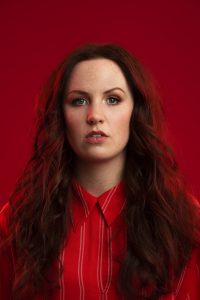Saying Something
Sam Bennett
“Who with?” I ask Catherine Bohart, on learning about her plans to move house. Fellow comedian and her partner, Sarah Keyworth, she tells me. They already cohabit but this move will mark the first time they’ve lived together without anybody else. “Imagine,” resumes the Irish stand-up, “if I was calling you like, ‘I’m moving out, Sam, I’m leaving her.’”

Sarah – who she’s been with four years – is home during our chat, donning a quizzical look when it covers porn. (“It’s actually a good question, Sarah,” she says, “go away.”) A debater throughout school and university, her first exposure to pornography was discussing its ethics, “a very dull way” involving questions about whether or not the performers had unions. “I think I’d over-intellectualised porn before I got to the stage where I could sexualise porn, so I ruined it for myself.” She wasn’t in the dark about sex though, largely thanks to her mother who “loves talking about it. I remember her being of the view that if you were old enough to ask, you were old enough to be answered. Often those answers were more detailed than any child wanted, but we got it anyway.” Her mum does not regard sex as something filthy, I’m told, and wanted her children to understand it and be safe, but also feel it was something they were entitled to enjoy. “An incredibly healthy attitude to give your children, she did a really cool thing – but the woman talks about sex too much, for sure.
![[Catherine Bohart Lemon]_[Chambers Touring_pressimage7 (2)](https://www.fyne.co.uk/wp-content/uploads/2020/02/Catherine-Bohart-Lemon_Chambers-Touring_pressimage7-2-300x224.jpg)
That woman didn’t do uni, the Funny Women Awards finalist says as we talk female influences, “but she is incredibly well read and has an incredibly curious mind. My house was always a matriarchy (as often Irish homes are) and she just doesn’t hold back, she’s not scared of having an opinion and never saw that as a problem.” She’s complex, states the comic, “religious, liberal, inclusive, thoughtful and willing to learn”. Then there’s Sarah (likewise keen to grow and exceedingly ambitious); her “very political” sister; Ireland’s first woman president, Mary Robinson; and Joan Rivers, the first female comic she saw on television. Insofar as inspiration for her latest show goes, Lemon somewhat owes its existence to an encounter with an audience member in a yellow cardigan, following an Edinburgh Fringe performance of 2018’s Immaculate. “She was aghast at the content and said I was disgusting for talking about my sex life on stage. I hadn’t talked about my sex life, I talked about my sexuality, and I think people often conflate those things with queer people. They assume if you talk about your sexuality, you’re talking about sex.” Lemon, which sold-out last year’s Fringe, is a response to that spectator “and in a broader sense, to societal perceptions of queer relationships”.
I just expect people at such a festival to be broad-minded. “Exactly, it’s the Edinburgh Fringe, what did you think you were going to see?” I mention an exchange I had with Linus Karp, whose company recently staged Awkward Conversations with Animals I’ve F*cked, an Edinburgh Fringe run of which saw walkouts due to its bestiality content. The actor was a tad baffled as to quite what people were expecting given the title. Similarly, Immaculate’s content was introduced via its blurb, which informed readers Bohart was ‘the OCD, bisexual offspring of a Catholic deacon’. “You can’t go in there and be like, ‘what do you mean she’s bisexual?’ Also for me, as a creative person –” she corrects herself, “not as a creative person, as a person, to walk out I would have to be hor-ri-fied, I would have to hate something.” It could be because she’s frugal (“I’ve spent the money, I might as well see it”) but she also stays because she might learn something, even if she doesn’t agree with it. At her last Edinburgh, possibly one person every few days walked out. “At least you were saying something,” Ed Night told her. “You’re not being vague or sitting on a fence. If people are walking out, they’re reacting to a stance you’ve actually taken.”
![[Catherine Bohart Lemon]_[Chambers Touring_pressimage3 (2)](https://www.fyne.co.uk/wp-content/uploads/2020/02/Catherine-Bohart-Lemon_Chambers-Touring_pressimage3-2-300x200.jpg) In terms of screen, shortly before our interview, I’d watched her appearance on The Mash Report, a short segment called ‘How to be an immigrant British people like’. Sadly it had a broad reach, she says, telling me American people claimed it was as accurate in the States as in Britain. “I think it’s also frustrating that the piece probably did better, or was more palatable, because it was fronted by a white lady. But I do think it’s the beautiful thing about comedy: people can take on very serious issues and maybe even process them a little bit more if they’re made to laugh at the same time.” Viewers might be laughing, but how will she know if the piece has affected change? She doesn’t reckon you can determine the extent to which better treatment of immigrants is corollary to a three-minute comedy scene. “What you can measure, I guess, is the response; when people tell you that they at least feel seen and heard. When you are being discriminated against, it can be as harmful to feel like nobody notices or cares as it is for it to happen. You can measure people saying, ‘thank you for saying that, you said what I felt but couldn’t articulate.’” She recalls going into a Soho chocolate shop where the staff were immigrants who expressed gratitude for the video (she got a free lollypop too).
In terms of screen, shortly before our interview, I’d watched her appearance on The Mash Report, a short segment called ‘How to be an immigrant British people like’. Sadly it had a broad reach, she says, telling me American people claimed it was as accurate in the States as in Britain. “I think it’s also frustrating that the piece probably did better, or was more palatable, because it was fronted by a white lady. But I do think it’s the beautiful thing about comedy: people can take on very serious issues and maybe even process them a little bit more if they’re made to laugh at the same time.” Viewers might be laughing, but how will she know if the piece has affected change? She doesn’t reckon you can determine the extent to which better treatment of immigrants is corollary to a three-minute comedy scene. “What you can measure, I guess, is the response; when people tell you that they at least feel seen and heard. When you are being discriminated against, it can be as harmful to feel like nobody notices or cares as it is for it to happen. You can measure people saying, ‘thank you for saying that, you said what I felt but couldn’t articulate.’” She recalls going into a Soho chocolate shop where the staff were immigrants who expressed gratitude for the video (she got a free lollypop too).
With us speaking during preparations for LGBT History Month, I wonder if the queer community’s past is something in which she consciously engages herself. “I like to think that I do,” says the history graduate, “but – this is going to sound really trite and I don’t mean it to – I feel like drag introduced me to queer history in a really significant way.” The conversation turns to how accessible the likes of Paris is Burning and Pose have become. Has she finished the latter? “Oh my God yes. And it broke my heart. Did you watch season two?” I did. “How do you feel about Ricky and Pray Tell?” I tell her I want the dancer and emcee’s relationship to work out and her voice gets higher: “Me too. I love it – when they had breakfast and held hands, I was broken.” She cites their sex scene as “one of the most beautiful I’ve ever seen on television. Stun-ning. Stunning. It’s in seeing two gay black men portrayed in that way [that] you realise how it hasn’t been. You’re like, ‘oh, I’ve never seen this before on television in a way that isn’t fetishised.’ Pose is phenomenal, the fact there are so many trans actors is so great, my sister and I are obsessed.”
Perhaps it could inspire a name for the new flat; the House of Bohart is one I’d visit in a heartbeat – especially if her mother was over.
Lemon tours until 30 April.

